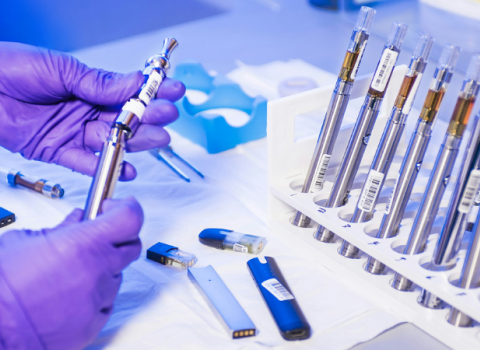It has been six years since a French biotech company made a stock market debut – and now two, BioAlliance and ExonHit, are doing so. Is the European market reawakening?
One swallow doesn't make a summer, but do two signal a thaw? Six years exactly since a French biotech made a stock market debut, two firms are doing so.
BioAlliance Pharma, a company that designs therapeutics targeting drug resistance in cancer, HIV, and severe infections, said this week it is seeking to raise about €30 million through a placing of new shares and an IPO on Euronext's Paris market. Two weeks earlier ExonHit Therapeutics, a French cancer diagnostics company, made its trading debut on Euronext's small-company exchange, Alternext in Paris, raising €6.5 million.
At the same time Ipsen, France's fourth-largest pharmaceutical company by sales, announced plans to raise €369 million in an initial public offering scheduled for next month. At 76 years of age, with turnover of €700 million in 2004 and 20 drugs on the market, this is a bird of a rather different feather, but could still be considered a test of investor sentiment towards biopharmaceuticals.
Euronext has several biotechnology companies listed, but the supply of French listings on the exchange - which includes markets in Paris, Amsterdam, Brussels, and Lisbon - has been poor. Before this month France had only five public biotechs, and the last successful French biotech float, on the Nouveau Marché, EuroNext's predecessor, was Nicox SA in 1999.
Are the tax breaks starting to work?
The question for French biotechs and their venture capital investors is whether the IPOs of BioAlliance and ExonHit show a corner has been turned.
Certainly, there have been moves to improve the climate for biotech investing in France. Under pressure from the trade body France Biotech the government introduced new measures to stimulate innovation in January 2004. The keystone was the creation of a new status for start-ups called Young Innovative Companies, which exempts them from taxes and social security contributions. Around 150 biotech companies have since applied for the status.
Building on this, in October 2005, the government launched Le Fonds de Fonds Technologique, which will spend €150 million a year over the next three years, matching venture capital investments in more mature companies that have the potential to get listings.
Now investors are campaigning for tax concessions for listed companies, asking the government to create a Young Listed Innovative Enterprise status for public companies that make a high level of investment in R&D.
The idea of Young Innovative Companies has caught on. Belgium has said it will introduce a similar measure in 2006, while last week the Swedish, Finnish, Norwegian and Estonian biotech trade associations launched a campaign to get Young Innovative Company status introduced in their respective countries.
No doubt investors do not want to invest in tax, but it remains to be seen if such measures will spark their wholehearted return to biotech.
"In the years that followed the dotcom/technology bust [in late 2000] the whole experience has made Continental European investors more cautious," commented Michael King, an equity analyst who covers pan-European pharmaceutical and European medical technology sectors for Code Securities Ltd.
Nathanaël Mauclair, senior manager at the listing department at Euronext, is optimistic. "We strongly believe there is a recovery in the biotech field. We have been through a tough market and investors have been staying away from risky businesses such as biotech. But now investors are asking for higher-risk/return stories and they are ready to invest in them."
In the past two years, says Mauclair, Euronext has had discussions with several biotech companies, but none of them came through. Now things are changing. "With Exonhit, which started trading this month, Ipsen, a large company, which has been approved, and BioAlliance, this is a definitely a strong sign of recovery," says Mauclair. "We are expecting some more applicants in the next 12 to 18 months. And I believe more small [biotech] companies will follow as they want to enhance their corporate profile and raise capital."
Faint pulse
Besides the two French deals, there has been a faint pulse lately in the London market, and occasional blips in Germany, Norway and elsewhere in Europe. But few analysts are ready to call a rally in European biotech stocks. A case in point: most of the companies getting onto the markets are far from the kind of wildcat bets that would signal a strong recovery. BioAlliance, for instance, is in the rare position for a young biotech company of having a product already done with Phase III clinical testing in Europe, and poised to begin sales. And for the company itself, there’s a lot more at stake on the Paris exchange than a test of investor sentiment.
"The challenge of the life science companies here is like anywhere else which is to commercialise their products," said BioAlliance's Vice President of Business Development Richard Keatinge in an interview. "Having a late stage product and having approval in the US makes a pretty strong story for us."
But since Nicox listed in 1999, others including Immuno-Designed Molecules in June 2004, and Meristem Therapeutics in 2001, have tried and failed to go public in France. No doubt, the downturn that followed the dotcom and genomics bust has not helped French companies or its peers elsewhere in Europe. Investors in France also had to cope with the downfall of the country’s flagship biotech company Genset. The genomics specialist raised $100 million in a joint IPO on Nasdaq and Nouveau Marché in June 1996. The shares soared to €238 early in 2000, only to plummet to €4 in June 2002. The remnants of the company were acquired by the Swiss biotech Serono for $65 million.
But it would be unfair to portray the dearth of IPOs as an issue in France alone. The wider European IPO market remains shaky. For every IPO that has got away one has been pulled, and those that have succeeded have been at low valuations.
So, for example, in May 2005 Arpida became the first Swiss biotech to float since Basilea Pharmaceutica early in 2004. But also in May, one of the country’s leading biotechs, Speedel, pulled its listing. In the same month shareholders in Galapagos NV swallowed hard when the company went public on Euronext, raising €20 million, half the initial target.
A more convincing debut was that of the Danish cancer specialist TopoTarget, which raised €37 million when it joined the Copenhagen exchange in June. Similarly, Germany has seen faint signs of a revival in the public markets this year after a profound drought following the collapse of the Neuer Markt in 2000. In January Paion AG raised €70 million, while last month Jerini AG raised €64 million, but at the low end of the pricing.
Active AIM
The only active market in Europe has been London's junior market AIM, which has seen a succession of small cap biotech companies listing since Ark Therapeutics pushed the IPO window open in April 2004. These include AbCam plc, which raised £10 million earlier this month, Phoqus plc, which raised £10 million a month earlier, and, proving the market has an appetite of sorts for risk, two stem cell development companies, ReNeuron and Stem Cell Sciences, over the summer.
But again, companies tried and failed to list in London in 2005, most notably Renovo, and EpiTan of Melbourne, Australia. Even ProStrakan, a company with annual turnover of £27 million, was forced to slash its proposed valuation by £100 million, and reduce the amount raised by £10 million to £40 million, when it joined the market in June.
This repeated the pattern of 2004, when some of the companies queuing up to list behind Ark succeeded in doing so, while others, notably Cyclacel and Microscience, pulled out.
In France, BioAlliance presents a relatively low risk for investors as its signature product, miconazole Lauriad 50 mg Bioadhesive Buccal Tablet, has just completed Phase III clinical trials in Europe for treatment of the fungal infection oral thrush in immunocompromised patients, such as those undergoing cancer chemotherapy or AIDS patients. The company has filed for marketing approval in Europe and a Phase III trial is expected to begin in the US in 2006.
The tablet is placed under patients' tongue to treat oral fungus. It could provide relief for 10 to 15 hours. The patient takes one tablet a day for 14 days straight, according to Keatinge. The product is competing with available treatments in gel form and mouthwash which require numerous applications a day.
The potential market for the tablet is €330 million - half in the US, a third in Europe and the rest in Japan, said Keatinge.
Keatinge said the proceeds from the IPO and the placement will be used to build a sales force for France and other countries in anticipation of the launch of the company's product in late 2006 or 2007.
"We will start in France and then expand into the big five markets in the EU," said Keatinge. "We will be also looking for a partner and to commercialise the product in the US."
The company was founded by Dominique Costantini and Gilles Avenard, both medical doctors, and has raised ₤27 million since its inception in 1997.
Investors in BioAlliance include Auriga Partners, Siparex Ventures, ING, the Dutch bank and insurance company, and the French Co-Investment Fund, Capricorn Venture Partners, ABN-AMRO Capital France, and SPEF Ventures.





 A unique international forum for public research organisations and companies to connect their external engagement with strategic interests around their R&D system.
A unique international forum for public research organisations and companies to connect their external engagement with strategic interests around their R&D system.